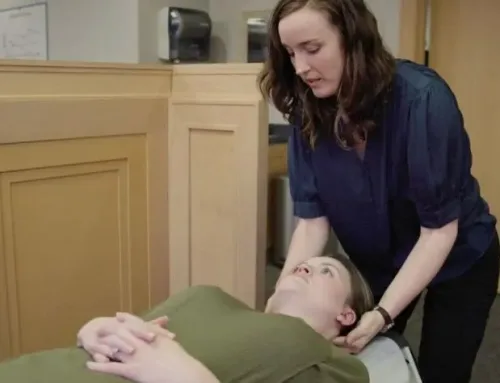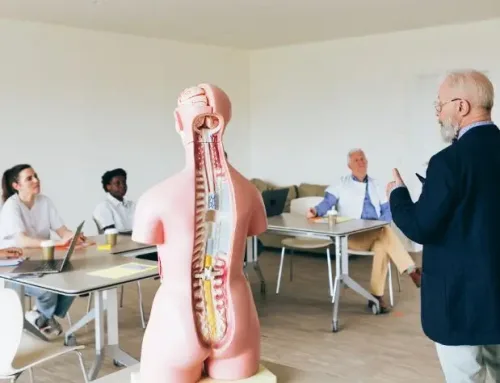Top Integrative Medicine Degree Programs: Education for Holistic Healthcare Careers

Choosing an integrative medicine degree means stepping into a healthcare future that treats the whole person—mind, body, and spirit. As more patients seek natural and preventive care alongside conventional treatments, professionals trained in integrative medicine are becoming essential in clinics, hospitals, and private practices across the country.
Wondering what kind of education can take you there—and which programs truly lead the way? Let’s take a closer look.
What Is an Integrative Medicine Degree?
An integrative medicine degree isn’t always a single, standalone credential. It’s often a concentration or specialized focus within broader health professions. Students may choose programs in acupuncture, chiropractic, or functional medicine, tailoring their studies to align with their interests in whole-person care. What ties these paths together is a shared foundation in holistic, patient-centered healthcare.
What Integrative Medicine Covers
Programs focused on integrative medicine bring together a diverse range of therapeutic approaches, combining modern science with traditional healing methods. Students study a blend of core medical sciences and hands-on healing practices designed to support long-term wellness.
You can expect training in areas such as:
- Clinical nutrition and dietary therapies
- Herbal medicine and botanical pharmacology
- Acupuncture and traditional Chinese medicine
- Mindfulness, meditation, and stress-reduction practices
- Manual therapies, including massage and bodywork
- Lifestyle medicine and behavior change techniques
This broad foundation equips students to provide care that supports both prevention and healing.
Where It’s Taught
Integrative medicine is taught through a variety of professional degree programs. Some of the common educational paths include:
- Acupuncture & Chinese Medicine
- Chiropractic
- Functional or Lifestyle Medicine
- Whole Health Leadership
- Integrative Health Coaching
- Nutritional Science and Herbalism
Each of these programs weaves integrative principles into rigorous, accredited healthcare education. The emphasis is on creating well-rounded practitioners ready to support patients with personalized, compassionate care.
Real-World Impact
Graduates of integrative medicine programs are trained to work across healthcare environments. They understand how to connect disciplines and communicate effectively with both patients and fellow providers. This collaboration makes them valuable in clinics, hospitals, wellness centers, and private practice settings.
With a strong foundation in both Western science and holistic therapies, integrative medicine professionals are positioned to lead in a healthcare landscape that increasingly values comprehensive, patient-first care.
What You Can Do with an Integrative Medicine Degree
If you’re the kind of person who loves connecting with others and being part of their healing journey, clinical care might be your path. These careers let you work directly with patients to help them feel better, live healthier, and take control of their well-being.
Here are a few roles that start with integrative medicine education:
- Licensed Acupuncturist or Doctor of Acupuncture Use acupuncture, herbal formulas, and other therapies to support healing and balance.
- Doctor of Chiropractic (DC) Help patients manage pain, improve mobility, and live more comfortably through adjustments, exercise, and lifestyle care.
- Functional Medicine Practitioner Focus on what’s really going on beneath the surface—helping people uncover and address the root causes of chronic health issues.
These are meaningful, hands-on careers where you get to make a difference every single day.
Coaching and Leadership Roles That Guide Big Change
Some people are natural guides—great listeners, motivators, and supporters. If that’s you, integrative health coaching could be a great fit. Health coaches walk alongside clients as they build healthier routines and mindsets that stick. It’s personal, rewarding work.
Others might be drawn to the bigger picture. As a Wellness Program Director or Health System Administrator, you can help shape how whole-person care is delivered—creating programs, building teams, and making sure patients get the best experience possible.
Teaching, Research, and Advocacy That Push the Field Forward
If you love digging into ideas, sharing knowledge, or creating real impact behind the scenes, there’s room for that too. Many graduates go on to become educators, teaching the next generation of holistic healthcare providers.
Some lead research studies, helping to expand what we know about integrative medicine and how it supports long-term wellness. Others work in policy or advocacy—making sure this kind of care is accessible and supported across healthcare systems.
There’s no one right path. With an integrative medicine degree, you’ve got options—and all of them make a real difference.
What Makes a Strong Integrative Medicine Program?
1. A Solid, Accredited Curriculum
The right program starts with credibility. Make sure the school holds both regional and programmatic accreditation, which means it’s been evaluated for academic quality and integrity. That’s your foundation for earning a respected degree—and qualifying for licensure in your field.
Look for programs that align with licensing boards like:
- NCCAOM National Certification Commission for Acupuncture and Oriental Medicine
- CALE California Acupuncture Licensing Exam
- NBCE National Board of Chiropractic Examiners
These qualifications are essential for launching your career confidently and legally.
2. A Whole-Person Approach to Learning
An integrative medicine program should reflect the very philosophy it teaches: care that considers every part of a person’s health. That means a curriculum that blends biomedical sciences with holistic modalities—and encourages critical thinking across both.
Courses should focus on more than just symptoms. They should teach you how to understand the root of illness, support prevention, and tailor care to the individual. Look for programs that prioritize mind-body-spirit connection and equip you to deliver thoughtful, compassionate care.
3. Clinical Experience That Prepares You for Real Practice
Hands-on training is where everything clicks. Clinical hours give you the chance to apply your knowledge, build confidence, and learn directly from licensed professionals. It’s also how you get comfortable working with real patients—and see the impact of your care in real time.
The best programs offer clinical rotations in integrative settings, serving diverse populations. You’ll want to train in environments where holistic and conventional providers work together, so you’re ready to step into collaborative healthcare after graduation.
4. Flexible Formats That Fit Your Life
Life doesn’t pause when you go back to school. Many students in this field are career changers, parents, or working professionals. That’s why flexible learning matters.
Look for hybrid or part-time options that give you structure without sacrificing your other responsibilities. Be sure the program clearly outlines what’s expected for in-person clinical hours—and that there’s support to help you meet those requirements smoothly.
5. Opportunities to Learn Alongside Other Disciplines
Integrative medicine thrives on collaboration. The more you understand how other professionals think and work, the stronger your care will be.
Choose a program that values interprofessional learning. That might mean acupuncture students training alongside chiropractic, nutrition, or medical students—sharing case discussions, clinical experiences, and perspectives. This kind of environment builds mutual respect and prepares you to be a strong team member in any healthcare setting.
Experience SCU: A University Built for Future Healthcare Leaders
At Southern California University of Health Sciences (SCU), we’ve been shaping the future of healthcare for more than 110 years. We’re a nationally recognized leader in integrative, whole-person health education—and we’ve never stopped innovating. Our programs bring together the best of traditional healing and modern clinical science to train compassionate, skilled professionals who are ready to lead in a changing healthcare landscape.
Our students come from all walks of life, united by a shared goal: to make a real difference in people’s lives. Whether you’re just starting your journey or taking the next step in your healthcare career, we’re here to support you every step of the way.
Master of Acupuncture and Chinese Herbal Medicine (MAcCHM)
Our MAcCHM program is rooted in the rich traditions of Eastern medicine while fully integrated with modern biomedical knowledge. Students learn how to treat patients using acupuncture, Chinese herbal medicine, and advanced diagnostic techniques. You’ll train in a curriculum designed to prepare you for national certification and California licensure, while also opening doors to advanced study.
Choose from three flexible formats:
- Full-time, daytime (in person) 3 years (9 terms)
- Full-time, evening (in person) 3 years, 8 months (11 terms)
- Part-time, blended flex up to 6 years (18 terms)
We welcome students with a range of academic backgrounds. If you have 90+ qualifying college credits, you may apply directly. If you have 47+ credits, you can enter our Bachelor’s in Health Sciences with a concentration in Eastern Medicine, then move into the master’s program seamlessly.
Graduates are prepared for the CALE and NCCAOM exams and can also go on to earn their Doctorate in Acupuncture and Chinese Medicine with just 16 additional credit hours. Early clinical experience, access to our cadaver lab, and rare opportunities like rotations at Children’s Hospital of Orange County (CHOC) make this program one-of-a-kind.
Doctor of Chiropractic (DC)
We’ve been leaders in chiropractic care since 1911, when we opened as Los Angeles College of Chiropractic—one of the first chiropractic colleges in the country. That legacy continues today through SCU’s forward-thinking curriculum, whole health philosophy, and supportive learning environment. Our chiropractic program blends cutting-edge science with deep respect for the body’s natural healing abilities. It’s offered in a hybrid format, giving students the flexibility of online learning along with immersive, hands-on training on campus.
Students build strong clinical skills through real-world experience at our health centers and have the option to specialize in Sports Medicine. Business coursework is built into the program, helping students graduate with both the knowledge to heal and the tools to succeed professionally.
A University Designed for the Future of Healthcare
SCU is a full ecosystem of integrative health education. Our students learn alongside peers in chiropractic, acupuncture, and nutrition, building the communication and collaboration skills they’ll need in real practice.
We’ve designed our university around the future of care—interconnected, whole-person, and team-based. Whether you’re aiming to become a practitioner, educator, or leader in health, we provide the foundation, mentorship, and clinical experience to help you thrive.
Explore all of SCU’s programs here. Let’s build the future of healthcare—together.
Bring Your Passion for Wellness to Life at SCU
An integrative medicine degree opens the door to a future where healing is personalized, evidence-informed, and rooted in compassion. Whether your interest lies in acupuncture, chiropractic, health coaching, or leadership, the right program gives you the tools to create real impact in people’s lives—and the confidence to lead.
At SCU, we’ve created a place where tradition meets innovation and students are empowered to grow into exceptional healthcare professionals. If you’re ready to build a meaningful career in holistic health, take a look at our admission requirements for your program of choice and apply today. We’re here to help you make it happen.
FAQs
What careers can I pursue with an integrative medicine degree?
You can work as an acupuncturist, chiropractor, functional medicine practitioner, health coach, or wellness program director, among others.
Do I need a bachelor’s degree to apply to an integrative medicine program?
Not always. Some programs accept applicants with 90+ college credits, and others offer pathways that begin with a bachelor’s-level track.
How long does it take to earn an integrative medicine degree?
It depends on the program. Some take as little as 3 years full-time, while part-time and flexible options can take up to 6 years.
What kind of clinical experience do SCU students get?
Students train in our health centers and can rotate through exciting placements like the Children’s Hospital of Orange County.
How flexible are SCU’s programs for working adults?
We offer hybrid learning, evening classes, and part-time options designed to fit your life and goals.
Related Posts




